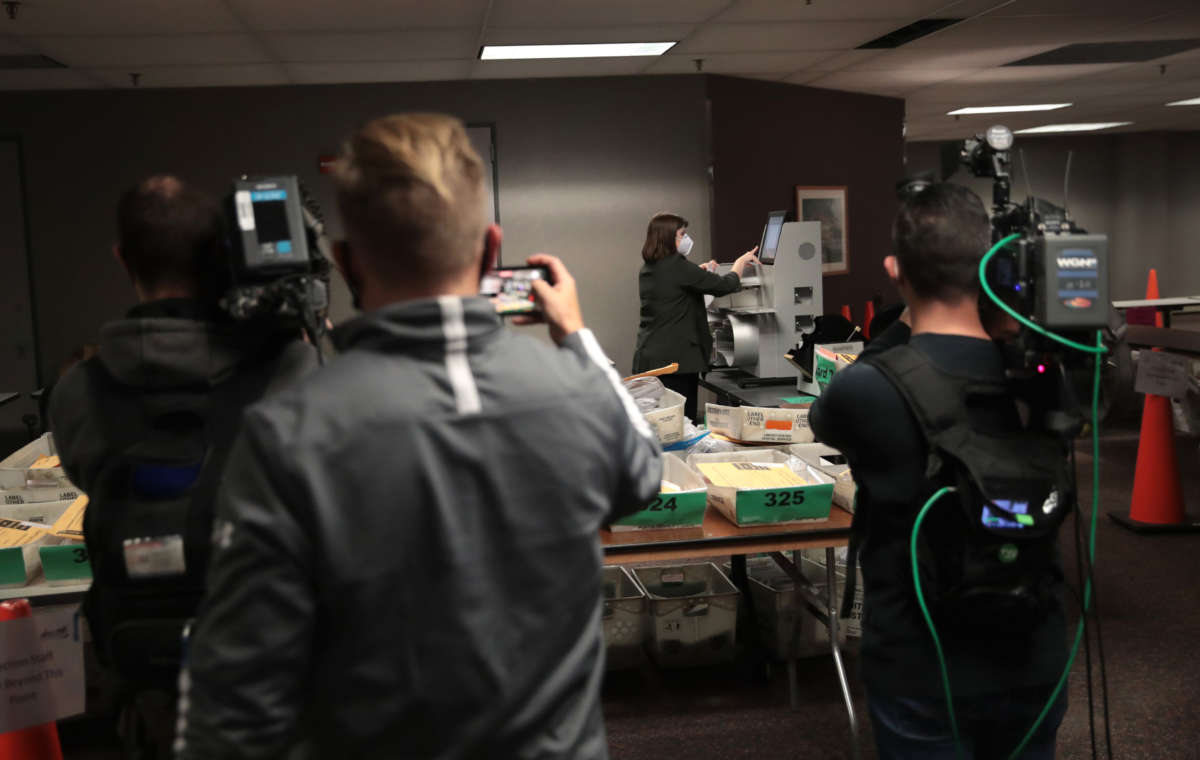Honest, paywall-free news is rare. Please support our boldly independent journalism with a donation of any size.
President Donald Trump has requested a partial recount in the state of Wisconsin, contesting the outcome of the 2020 presidential race in the state, which was won by his Democratic opponent, President-elect Joe Biden.
Biden was declared the winner by several media organizations on November 4, one day after Election Day. At first, returns on Tuesday evening had appeared to show Trump leading in the state, but as the counting of ballots continued into the night and into the early morning, Biden had pulled ahead. By Wednesday morning, the former vice president had taken the lead.
After votes were certified this week across all 72 counties in the state, Biden was shown to be ahead of Trump by a margin of over 20,000 votes.
In a statement announcing their intention to hold a recount, the Trump campaign alleged, without evidence, that ballots were “illegally altered” and that some absentee ballots were issued in an illegal manner. The campaign also claimed that “illegal advice given by government officials [allowed] Wisconsin’s Voter ID laws to be circumvented.”
None of the claims presented by the Trump campaign have been substantiated.
The campaign is not requesting a recount of the entire state. Rather, since Wisconsin law allows for campaigns in statewide races to request recounts of individual counties. Trump is requesting a recount in just the two most populous counties in Wisconsin, Dane and Milwaukee, both of which voted overwhelmingly for Biden.
Campaigns must pay for the recount process themselves, and the Trump campaign has already paid around $3 million to begin the process.
According to most experts and politicians in Wisconsin, a recount in the state has a near zero chance of overturning the election result, as previous recounts have not changed outcomes by more than a couple of hundred votes.
Former Gov. Scott Walker, a Republican who supports Trump, warned earlier this month that the 20,000-vote difference between Trump and Biden “is a high hurdle.”
“After recount in 2011 race for WI Supreme Court, there was a swing of 300 votes,” Walker tweeted earlier this month. “After recount in 2016 Presidential race in WI, @realDonaldTrump numbers went up by 131.”
Beyond his campaign’s official statement explaining their basis for a recount, the president has made other false claims on Twitter alleging fraud, contending that polls in the Badger State showing him behind Biden had suppressed the vote. Trump also said that ballots were found after Election Day that were improperly counted — a claim he has made about returns in other states as well but which have been found to hold no merit.
“They are finding Biden votes all over the place — in Pennsylvania, Wisconsin, and Michigan. So bad for our Country!” Trump said on November 4.
Trump’s claims are disconnected from reality, as vote counting in Wisconsin (as well as in other states) was delayed this year because of a law on the books mandating that absentee ballots not be counted until Election Day itself. The process of counting absentee ballots is typically a long one, requiring each ballot’s signature to be matched to signatures in local poll books.
Ballots that are clearly marked but damaged in a way that won’t allow voting machines to read them are also allowed to be recreated by election officials.
Because of a huge influx of absentee ballots this year — with one estimate saying 1.9 million out of the close to 3.3 million cast in Wisconsin — the process of counting votes after the election took even longer than usual.
Perhaps anticipating the president’s claims of fraud (as he had been signaling his intent to do all year long leading up to the election), Meagan Wolfe, the head of the bipartisan Wisconsin Elections Commission, had said the day before the election that results being later than usual should not be interpreted as a sign of improprieties at the polls.
“If unofficial results aren’t available until the next morning, it does not mean that something went wrong. It means that election officials are doing their jobs, and their job is to make sure that every valid ballot gets counted,” Wolfe said on November 2.
Press freedom is under attack
As Trump cracks down on political speech, independent media is increasingly necessary.
Truthout produces reporting you won’t see in the mainstream: journalism from the frontlines of global conflict, interviews with grassroots movement leaders, high-quality legal analysis and more.
Our work is possible thanks to reader support. Help Truthout catalyze change and social justice — make a tax-deductible monthly or one-time donation today.
